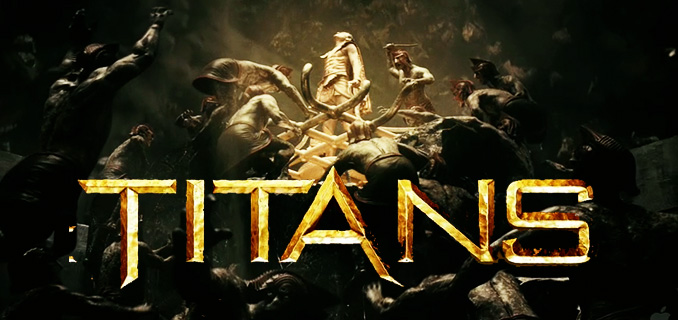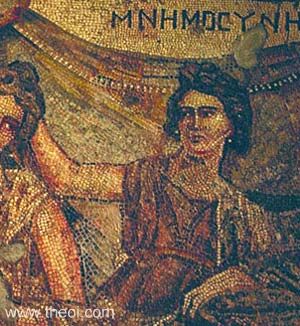Friedrich Georg Jünger: The Titans and the Coming of the Titanic Age
Source: theoccidentalobserver.net

Translated from the German and with an Introduction by Tom Sunic
Introduction: Titans, Gods and Pagans by Tom Sunic
Below is my translation of several passages from the last two chapters from Friedrich Georg Jünger’s little known book, Die Titanen, 1943, 1944 (The Titans). Only the subtitles are mine. F.G. Jünger was the younger brother of Ernst Jünger who wrote extensively about ancient Greek gods and goddesses. His studies on the meaning of Prometheism and Titanism are unavoidable for obtaining a better understanding of the devastating effects of the modern belief in progress and the role of “high-tech” in our postmodern societies. Outside the German-speaking countries, F.G. Jünger’s literary work remains largely unknown, although he had a decisive influence on his renowned brother, the essayist Ernst Jünger. Some parts of F.G Jünger’s other book, Griechische Götter (1943) (Greek Gods), with a similar, if not same topic, and containing also some passages from Die Titanen, were recently translated into French (Les Titans et les dieux, 2013).
 Friedrich Georg Jünger (1898-1977) |
Ancient European myths, legends and folk tales are often derided by some scholars, including some Christian theologians who claim to see in them gross reenactments of European barbarism, superstition and sexual promiscuity. However, if a reader or a researcher immerses himself in the symbolism of the European myths, let alone if he tries to decipher the allegorical meaning of diverse creatures in the myths, such as for instance the scenes from the Orphic rituals, the hellhole of Tartarus, or the carnage in the Nibelungen saga, or the final divine battle in Ragnarök, then those mythical scenes take on an entirely different meaning. After all, in our modern so-called enlightened and freedom-loving liberal societies, citizens are also entangled in a profusion of bizarre infra-political myths, in a myriad of weird hagiographic tales, especially those dealing with World War II vicitmhoods, as well as countless trans-political, multicultural hoaxes enforced under penalty of law. Therefore, understanding the ancient European myths means, first and foremost, reading between the lines and strengthening one’s sense of the metaphor.
There persists a dangerous misunderstanding between White nationalists professing paganism vs. White nationalists professing Christian beliefs. The word “paganism” has acquired a pejorative meaning, often associated with childish behavior of some obscure New Age individuals carrying burning torches or reading the entrails of dead animals. This is a fundamentally false conception of the original meaning of paganism. “Pagans,” or better yet polytheists, included scores of thinkers from antiquity, such as Seneca, Heraclites, Plato, etc. who were not at all like many modern self-styled and self-proclaimed “pagans” worshipping dogs or gazing at the setting sun. Being a “pagan” denotes a method of conceptualizing the world beyond the dualism of “either-or.” The pagan outlook focuses on the rejection of all dogmas and looks instead at the notion of the political or the historical from diverse and conflicting perspectives. Figuratively speaking, the plurality of gods means also the plurality of different beliefs and different truths. One can be a good Christian but also a good “pagan.” For that matter even the “pagan” Ernst Jünger, F.G. Jünger’s older brother, had a very Catholic burial in 1998.
When F.G Jünger’s published his books on the Titans and the gods, in 1943 and in 1944, Germany lay in ruins, thus ominously reflecting F.G. Jünger’s earlier premonitions about the imminent clash of the Titans. With gods now having departed from our disenchanted and desacralized White Europe and White America, we might just as well have another look at the slumbering Titans who had once successfully fought against Chaos, only to be later forcefully dislodged by their own divine progeny.
Are the dozing Titans our political option today? F.G. Jünger’s book is important insofar as it offers a reader a handy manual for understanding a likely reawakening of the Titans and for decoding the meaning of the new and fast approaching chaos.
* * *
The Titans: Custodians of Law and Order
….The Titans are not the Gods even though they generate the Gods and relish divine reverence in the kingdom of Zeus. The world in which the Titans rule is a world without the Gods. Whoever desires to imagine a kosmos atheos, i.e. a godless cosmos, that is, a cosmos not as such as depicted by natural sciences, will find it there. The Titans and the Gods differ, and, given that their differences are visible in their behavior toward man and in view of the fact that man himself experiences on his own as to how they rule, man, by virtue of his own experience, is able to make a distinction between them.
Neither are the Titans unrestrained power hungry beings, nor do they scorn the law; rather, they are the rulers over a legal system whose necessity must never be put in doubt. In an awe-inspiring fashion, it is the flux of primordial elements over which they rule, holding bridle and reins in their hands, as seen in Helios. They are the guardians, custodians, supervisors and the guides of the order. They are the founders unfolding beyond chaos, as pointed out by Homer in his remarks about Atlas who shoulders the long columns holding the heavens and the Earth. Their rule rules out any confusion, any disorderly power performance. Rather, they constitute a powerful deterrent against chaos.
The Titans and the Gods match with each other. Just as Zeus stands in for Kronos, so does Poseidon stand in opposition to Oceanus, or for that matter Hyperion and his son Helios in opposition to Apollo, or Coeus and Phoebe in opposition to Apollo and Artemis, or Selene in opposition to Artemis.
The Titans Against the Gods
What distinguishes the kingdom of Kronos from the kingdom of Zeus? One thing is for certain; the kingdom of Kronos is not a kingdom of the son. The sons are hidden in Kronos, who devoured those he himself had generated, the sons being now hidden in his dominion, whereas Zeus is kept away from Kronos by Rhea, who hides and raises Zeus in the caverns. And given that Kronos comports himself in such a manner his kingdom will never be a kingdom of the father. Kronos does not want to be a father because fatherhood is equivalent with a constant menace to his rule. To him fatherhood signifies an endeavor and prearrangement aimed at his downfall.
What does Kronos want, anyway? He wants to preserve the cycle of the status quo over which he presides; he wants to keep it unchanged. He wants to toss and turn it within himself from one eon to another eon. Preservation and perseverance were already the hallmark of his father. Although his father Uranusdid not strive toward the Titanic becoming, he did, however, desire to continue his reign in the realm of spaciousness. Uranus was old, unimaginably old, as old as metal and stones. He was of iron-like strength that ran counter to the process of becoming. But Kronos is also old. Why is he so old? Can this fluctuation of the Titanic forces take on at the same time traits of the immovable and unchangeable? Yes, of course it can, if one observes it from the perspective of the return, or from the point of view of the return of the same. If one attempts it, one can uncover the mechanical side in this ceaseless flux of the movement. The movement unveils itself as a rigid and inviolable law.
The Infinite Sadness of the Titans
How can we describe the sufferings of the Titans? How much do they suffer anyway, and what do they suffer from? The sound of grief uttered by the chained Prometheus induces Hermes to derisive remarks about the same behavior which is unknown to Zeus. In so far as the Titans are in the process of moving, we must therefore also conceive of them as the objects of removal. Their struggle is onerous; it is filled with anxiety of becoming. And their anxiety means suffering. Grandiose things are being accomplished by the Titans, but grandiose things are being imposed on them too. And because the Titans are closer to chaos than Gods are, chaotic elements reveal themselves amidst them more saliently. No necessity appears as yet in chaos because chaos has not yet been measured off by any legal system. The necessity springs up only when it can be gauged by virtue of some lawfulness. This is shown in the case of Uranus and Kronos. The necessary keeps increasing insofar as lawfulness increases; it gets stronger when the lawful movements occur, that is, when the movements start reoccurring over and over again.
 Mnemosyne (The Titaness of Memory) (mosaic, 2nd century AD) |
The Self-Sufficient Gods
The Olympian Gods, however, do not suffer like the Titans. They are happy with themselves; they are self-sufficient. They do not ignore the pain and sufferings of man. They in fact conjure up these sufferings, but they also heal them. In Epicurean thought, in the Epicurean world of happiness, we observe the Gods dwelling in-between-the-worlds, divorced from the life of the earth and separated from the life of men, to a degree that nothing can ever reach out to them and nothing can ever come from them. They enjoy themselves in an eternal halcyon bliss that cannot be conveyed by words.
The idea of the Gods being devoid of destiny is brought out here insofar as it goes well beyond all power and all powerlessness; it is as if the Gods had been placed in a deepest sleep, as if they were not there for us. Man, therefore, has no need to think of them. He must only leave them alone in their blissful slumber. But this is a philosophical thought, alien to the myth.
Under Kronos, man is part of the Titanic order. He does not stand yet in the opposition to the order — an opposition founded in the reign of Zeus. He experiences now the forces of the Titans; he lives alongside them. The fisherman and boatman venturing out on the sea are in their Titanic element. The same happens with the shepherd, the farmer, the hunter in their realm. Hyperion, Helios and Eos determine their days, Selene regulates their nights. They observe the running Iris, they see the Horae dancing and spinning around throughout the year. They observe the walk of the nymphs Pleiades and Hyades in the skies. They recognize the rule of the great Titanic mothers, Gaia, Rhea, Mnemosyne and that of Gaia-Themis. Above all of them rules and reigns the old Kronos, who keeps a record of what happens in the skies, on the earth, and in the waters.
Titanic Necessity vs. Divine Destiny
The course of human life is inextricably linked to the Titanic order. Life makes one whole with it; the course of life cannot be divorced from this order. It is the flow of time, the year’s course, the day’s course. The tides and the stars are on the move. The process resembles a ceaseless flow of the river. Kronos reigns over it and makes sure it keeps returning. Everything returns and everything repeats itself — everything is the same. This is the law of the Titans; this is their necessity. In their motion a strict cyclical order manifests itself. In this order there is a regular cyclical return that no man can escape. Man’s life is a reflection of this cyclic order; it turns around in a Titanic cycle of Kronos.
Man has no destiny here, in contrast to the demigods and the heroes who all have it. The kingdom of Zeus is teeming with life and deeds of heroes, offering an inexhaustible material to the songs, to the epics and to the tragedies. In the kingdom of Kronos, however, there are no heroes; there is no Heroic Age. For man, Kronos, and the Titans have no destiny; they are themselves devoid of destiny. Does Helios, does Selene, does Eos have a destiny? Wherever the Titanic necessity rules, there cannot be a destiny. But the Gods are also deprived of destiny wherever divine necessity prevails, wherever man grasps the Gods in a fashion that is not in opposition to them. But a man whom the Gods confront has a destiny. A man whom the Titans confront perishes; he succumbs to a catastrophe.
We can say, however, that whatever happens to man under the rule of the Titans is a lot easier than under the rule of the Gods. The burden imposed on man is much lighter.
* * *
What happens when the Gods turn away from man and when they leave him on his own? Wherever they make themselves unrecognizable to man, wherever their care for man fades away, wherever man’s fate begins and ends without them, there always happens the same thing. The Titanic forces return and they validate their claims to power. Where no Gods are, there are the Titans. This is a relationship of a legal order which no man can escape wherever he may turn to. The Titans are immortal. They are always there. They always strive to reestablish their old dominion of their foregone might. This is the dream of the Titanic race of the lapetos, and all the Iapetides who dream about it. The earth is penetrated and filled up with the Titanic forces. The Titans sit in ambush, on the lookout, ready to break out and break up their chains and restore the empire of Kronos.
Titanic man
What is Titanic about man? The Titanic trait occurs everywhere and it can be described in many ways. Titanic is a man who completely relies only upon himself and has boundless confidence in his own powers. This confidence absolves him, but at the same time it isolates him in a Promethean mode. It gives him a feeling of independence, albeit not devoid of arrogance, violence, and defiance. Titanic is a quest for unfettered freedom and independence. However, wherever this quest is to be seen there appears a regulatory factor, a mechanically operating necessity that emerges as a correction to such a quest. This is the end of all the Promethean striving, which is well known to Zeus only. The new world created by Prometheus is not.
Dr. Tom Sunic is a former political science professor, author and a Board member of the American Freedom Party. He is the author of Against Democracy and Equality; The European New Right.
Source: theoccidentalobserver.net
Radio 3Fourteen
Tom Sunic - Metapolitics, Paganism & European Identity






















